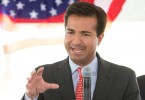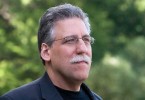Although she would never say so herself, Holly Twyford is the most sought-after actress in Washington, DC. She has played the lead in scores of dramas and is DC’s veritable Meryl Streep (she, too, has been the victim of the “not her again,” observation, such is the regularity with which she appears on stage here.) She also directs.
“But I can count on the fingers of one hand the amount of times I have played a gay character,” said Twyford, who eschewed Broadway for a home life in the DC area with her wife and young daughter.
Most recently, however, Twyford did just that, taking the lead in Bad Dog at Olney Theatre. The play epitomized what is generally viewed as a welcome and healthy trend — it was not a play about being gay or a play about straight people with a token gay character. It was about life, with not one, but three, female gay characters. Yet their sexuality was almost irrelevant, although one family did walk out after a lesbian kiss early in the play, a moment that hit Twyford as a personal comment on her and not just her character.
Bad Dog, however, was a step away from stereotyping that Twyford says “is still being taken I think, and is another way to see we really are all in this human condition together.” Bad Dog, she says, “really had to do with family dynamics which are absolutely universal and with addiction which is sadly incredibly universal as well. I think that was wonderful.”
When British actor, Ian McKellan, first received the script of the television comedy series, Vicious, he was worried it might further stereotype gay men (he did amend the title from its original Vicious Old Queens but only because, quipped the 76-year old, “I’m not old!”)
But Vicious is also somewhat of a departure. The leads went to McKellen and Derek Jacobi, both gay, and unlike the earlier traditional sitcoms, they do not play the lovable gay neighbors. The neighbors are everyone else in the show.
Cole Burden enjoyed flinging himself on a pool table in a hot embrace with co-star Christine Dwyer, night after night during a run of the musical, Murder Ballad, at Studio Theatre in DC last summer. But Burden also recognized early in his career that “if you can’t play straight then you won’t work.” While Burden is routinely cast as the leading man type, his personal history finds him gravitating toward parts that offer a little more edginess.
“Growing up in the south in a small town where I was really terrified of coming out — I was actually fearful for my life — I think there was a lot of me that lived in the shadow,” said Burden who’s now based in New York. “I can identify with some of these darker characters. As a gay actor coming out and learning how to love myself, I had to know that about me and also start to love me. But I never really lost the understanding of what it’s like to be unconscious, to hide, and to be stressed and frustrated because you are hiding part of yourself.”
That notion of needing to hide hit home most painfully when a drama school teacher told Burden to “look into a mirror and any physicality that was gay, write it down and not do it.” It was tough advice that felt like an assault on Burden’s authentic self. “The first part of my career in New York was a lot of looking at what do I have to be in work versus who I am as a person,” he said.
It’s a difficult dilemma. Twyford was recently working with a young actor who was, she says, “very, as we used to say, flamboyant, fairly effeminate and very talented. And I had the debate with myself at least ten times, should I say something to him?” She paused. “And then I’m thinking, ‘what am I saying?’ Basically I am saying he needs to straighten up, you know, to get more work, which sadly I think is the truth.”
Stepping outside of who you are and pretending, is one reason gays and lesbians gravitate to theatre, asserts Michael Bobbitt, artistic director at Adventure Theatre/MTC. Bobbitt recently choreographed Olney’s Guys and Dolls in which, he laughed, “I looked at all those manly gangsters shooting craps and virtually half of them are gay.”
Bobbitt says “the theatre is just a way to escape. A lot of gay people are either ostracized from other people or they feel themselves ostracized. In theatre, you can make a living from pretending so yes, the odd man out does sort of gravitate toward theatre, because it’s a chance to express something you have been doing all your life in many ways.”
There are also, says Bobbitt, “so many gay people that play straight parts. All the time.” McKellen, who has spent a storied career playing countless straight roles until Vicious, would doubtless agree. “One of the reasons I became an actor was that you could meet gay people,” he once told an interviewer.
The welcome emergence of gay — and even transgender — roles from side-kick to center stage is apparent in film as well as television and theatre. In the case of McKellen and Jacobi, there is finally a chance to play gay. But gay lead roles, especially in the film world, which Twyford says “feels like a much more straight atmosphere” than the theatre, still tend to go to straight actors. Think Jake Gyllenhaal and Heath Ledger in 2005‘s Brokeback Mountain and, more recently, Cate Blanchett and Rooney Mara in Carol.
Gyllenhaal, however, feels that Brokeback Mountain might have helped create a more accepting environment that paved the way for the Supreme Court decision on marriage equality. “I felt like we had been part, a little part and parcel of that movement,” he said in an interview. “I was proud, you know? To me that’s really a pretty incredible moment.”
Matt Damon, who played gay icon Liberace’s lover in Behind the Candelabra, caused a bit of a stir when remarks he made suggested he thought gay actors should not come out at all. He pointed to openly gay British actor, Rupert Everett, saying: “This guy – more handsome than anybody, a classically trained actor – it’s tough to make the argument that he didn’t take a hit for being out.”
The counter argument of course is that the play’s the thing and the sexuality of an actor cast in a particular role should disappear in the performance, which all the gay actors I talked to thought Gyllenhaal and Ledger achieved flawlessly in Brokeback Mountain.
“I’m absolutely an advocate for heterosexual playing homosexual if they really understand the story and if they really are the right person to tell the story,” said Burden. Twyford agreed. “I think the only way that Brokeback Mountain was going to be made was if two straight actors did that,” she said.
That observation caused Twyford to remember lines from a play — The Little Dog Laughed by Douglas Carter Beane — in which she played Diane, a hard-nosed lesbian theatrical agent with a closeted client who wants to come out in a film in which he would be playing gay. “If a perceived straight actor plays a gay role in a feature film, it’s noble,” Diane tells him. “It’s a stretch. It’s the pretty lady putting on the fake nose and winning an Oscar. If an actor with a “friend” plays a gay role it’s not acting, it’s bragging.”
Burden did finally get to play gay, in a small independent film called Rainbow Bridge Motel. “It was the first time professionally that I had gotten to play a gay character at a time when gay marriage had just been fully accepted,” said Burden of the project in which he played one half of a gay couple and which filmed last summer during the Supreme Court decision on marriage equality. “From my audition process to actually shooting, that law was passed.”
In keeping with the new trend, Rainbow was not made as a gay film but is about “two people in love that are just trying to navigate a ridiculous situation,” said filmmakers Scott Rubin and J. Garrett Vorreteur on their Indiegogo website. “Dean and Darren are not different, or odd, or depraved because of who they are or who they love, they are just people.”
Ironically though, only Burden’s role and a female character were played by gay actors. “I was playing opposite a straight actor, and I fell a little bit in love with him,” Burden said with a laugh. “And there was this scene where I had to throw him down and kiss him and there was a little bit of me that said, ‘wait a minute, this is my job?’ Because I kind of wanted to do this the first time I saw him!”
Photo Credit: dctheatrescene.com







